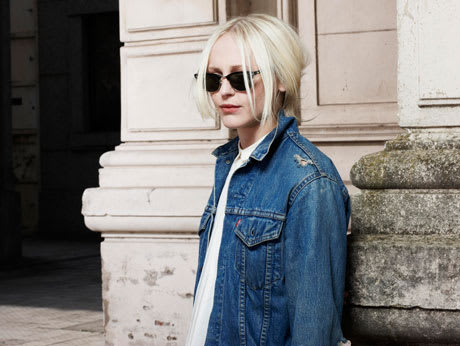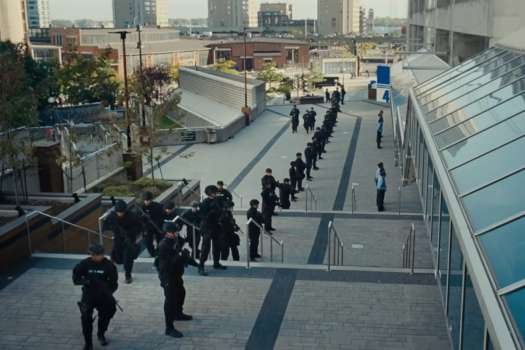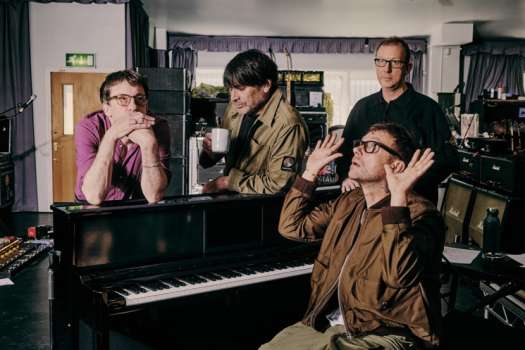In just over three years, Laura Marling has released two Mercury nominated albums and won Best Female Solo Artist at the 2011 Brit award. She's also been the subject of much gossip over her romantic liaisons with lead members of fellow nu-folk scenesters Noah and the Whale and Mumford and Sons. By way of pressure or distraction, her third offering had the potential to sink or soar. And soar it does, as Marling takes us on a journey through country western, Celtic folk storytelling and British folk-rock, sometimes in the course of the same song. A Creature I Don't Know showcases a dramatic and more refined performer and songwriter. Still present are familiar echoes of Bob Dylan and Joni Mitchell, insightful lyricism and beautifully fluid melodies. Her supple voice shifts from sounding bleak and resigned ― almost fatigued at the tender age of 22 ― to one of palpable restraint, foreshadowing what's to come both lyrically and musically. Once Marling cuts loose, her stormy abandon takes a form that's as controlled and confident as it is raw and fierce. Stellar tracks include "Sophia," "Salinas" and "My Friends."
Is it just my impression or is there a lot more anger on this record?
You would almost know better than I would, I suppose; I can't look at it objectively. I was so far involved in writing it that I've forgotten what was going on because I don't tend to edit when I write. If I thought about it too much, I wouldn't release anything. Yes, I guess there is a lot of anger, but there's also a lot of humour in it ― there's a tipping balance somewhere.
Can you point to an example of this?
The first song, "The Muse," was intended to be a little cheeky and slightly humorous. I'm not a gag-a-minute or stand-up comedian ― there's a kind of teasing to it. Even when I was writing "The Beast," I thought, "This is creepy. You're being weird. You're being nasty and taunting." But it sort of made me sadistically giggle rather than reach for the darkness.
It almost has a menacing feel to it, sonically as well as lyrically, and clocks in at close to six minutes. Would you say you gave yourself more creative license with "The Beast"?
When I had written it and came to record it, I knew that it held a specific purpose within the album. I was aware that... well, let's just say I would be surprised if anyone would listen to that song more than a couple times because I don't think that it's particularly pleasant to listen to. It's melodically very simple and very dense. I suppose that it is the most I've allowed artistic license.
So what is its purpose?
The beast is the concept. The beast changes throughout the album. Sometimes the beast is one perspective or one character and then it's another character, and sometimes it's a figurative thing. The idea throughout the album is [about] extremes: somebody really questioning morality and choosing goodness and somebody ignoring morality and choosing a darker, less moral [course]. I think these are the two sides of a person ― that's the battle between one's ability to make good and correct choices and one's willingness to make incorrect ones. I was quite fixated on the idea that your choices may not be ideal, but everyone is always given a choice. So often we make these awful choices that we know are destructive, that will make us unhappy and more importantly, will make others unhappy. And I am fascinated by why, because surely everybody's goal is happiness, to get on in life without being held back.
The song has an almost menacing quality sonically. Did you set out with the intention to create a record with more intense peaks and valleys in comparison to your gentler previous albums?
It was, in some respects, but not really consciously, I don't think. I definitely wanted the album to have a punch to it. I wanted it to sound fierce and menacing, and I wanted it to sound a bit cheeky and humorous, but only when the minds of Ethan [Johns, producer] and the band came into it did it become that. We had rehearsed it in sequence and then recorded it [live] in sequence as it appears on the album. I think the band and Ethan and I, when we stepped into the studio, we were in this space, this world of the creature of this story. But I think Ethan was more the force behind that idea of rising and falling. And we thought of it as a record rather than a CD. We wanted "The Beast" to be the end of side of side A and "Night After Night" to start side B. We wanted it to sort of be like punching someone in the face and then pouring water over them. That's what it felt like when we recorded it, like being brutal [when] recording "The Beast" and then rubbing salt over a wound starting with "Night After Night."
(Ribbon)Is it just my impression or is there a lot more anger on this record?
You would almost know better than I would, I suppose; I can't look at it objectively. I was so far involved in writing it that I've forgotten what was going on because I don't tend to edit when I write. If I thought about it too much, I wouldn't release anything. Yes, I guess there is a lot of anger, but there's also a lot of humour in it ― there's a tipping balance somewhere.
Can you point to an example of this?
The first song, "The Muse," was intended to be a little cheeky and slightly humorous. I'm not a gag-a-minute or stand-up comedian ― there's a kind of teasing to it. Even when I was writing "The Beast," I thought, "This is creepy. You're being weird. You're being nasty and taunting." But it sort of made me sadistically giggle rather than reach for the darkness.
It almost has a menacing feel to it, sonically as well as lyrically, and clocks in at close to six minutes. Would you say you gave yourself more creative license with "The Beast"?
When I had written it and came to record it, I knew that it held a specific purpose within the album. I was aware that... well, let's just say I would be surprised if anyone would listen to that song more than a couple times because I don't think that it's particularly pleasant to listen to. It's melodically very simple and very dense. I suppose that it is the most I've allowed artistic license.
So what is its purpose?
The beast is the concept. The beast changes throughout the album. Sometimes the beast is one perspective or one character and then it's another character, and sometimes it's a figurative thing. The idea throughout the album is [about] extremes: somebody really questioning morality and choosing goodness and somebody ignoring morality and choosing a darker, less moral [course]. I think these are the two sides of a person ― that's the battle between one's ability to make good and correct choices and one's willingness to make incorrect ones. I was quite fixated on the idea that your choices may not be ideal, but everyone is always given a choice. So often we make these awful choices that we know are destructive, that will make us unhappy and more importantly, will make others unhappy. And I am fascinated by why, because surely everybody's goal is happiness, to get on in life without being held back.
The song has an almost menacing quality sonically. Did you set out with the intention to create a record with more intense peaks and valleys in comparison to your gentler previous albums?
It was, in some respects, but not really consciously, I don't think. I definitely wanted the album to have a punch to it. I wanted it to sound fierce and menacing, and I wanted it to sound a bit cheeky and humorous, but only when the minds of Ethan [Johns, producer] and the band came into it did it become that. We had rehearsed it in sequence and then recorded it [live] in sequence as it appears on the album. I think the band and Ethan and I, when we stepped into the studio, we were in this space, this world of the creature of this story. But I think Ethan was more the force behind that idea of rising and falling. And we thought of it as a record rather than a CD. We wanted "The Beast" to be the end of side of side A and "Night After Night" to start side B. We wanted it to sort of be like punching someone in the face and then pouring water over them. That's what it felt like when we recorded it, like being brutal [when] recording "The Beast" and then rubbing salt over a wound starting with "Night After Night."




